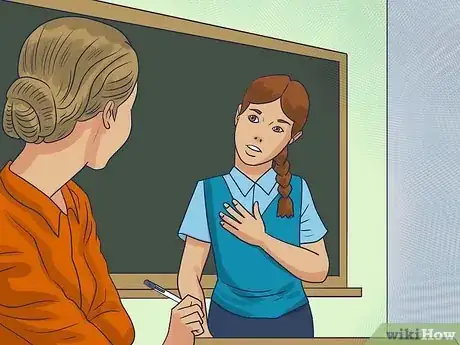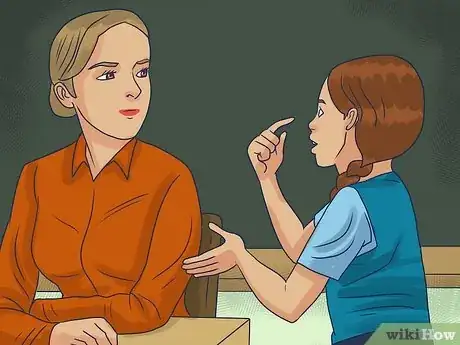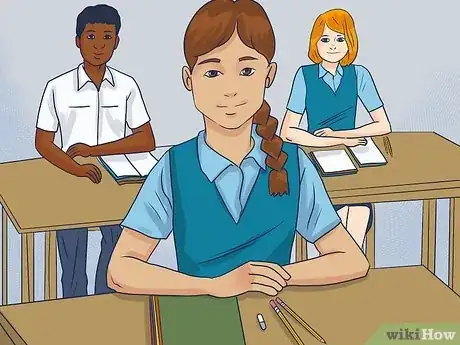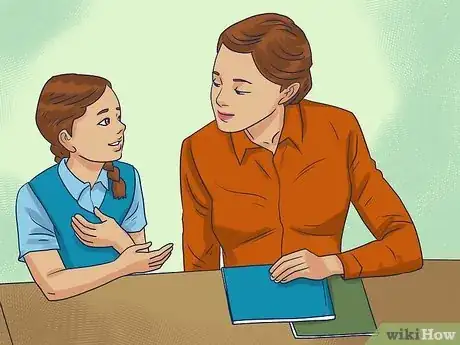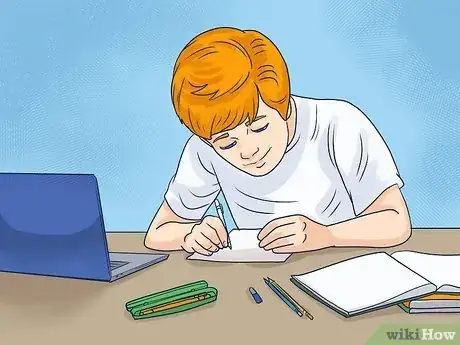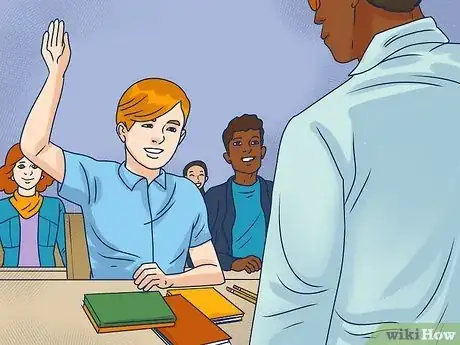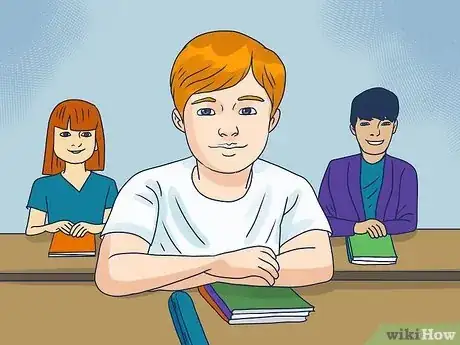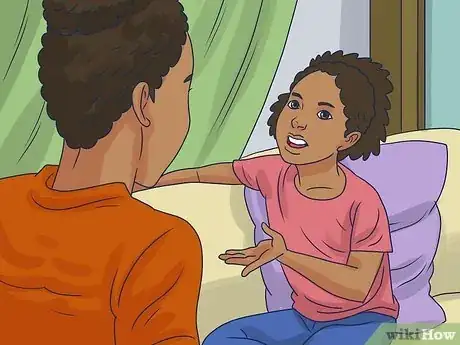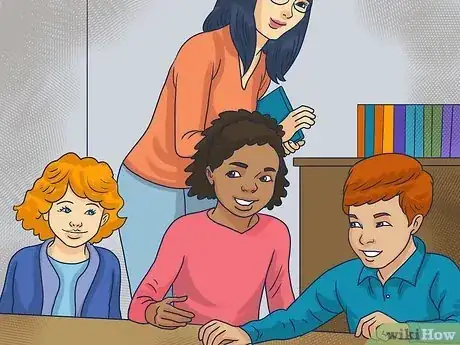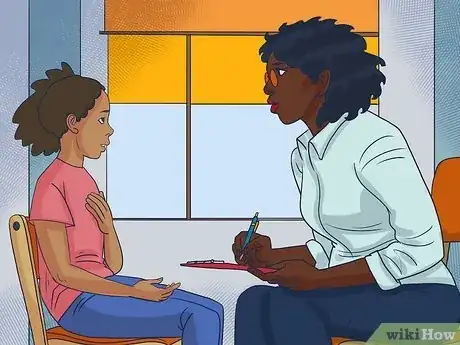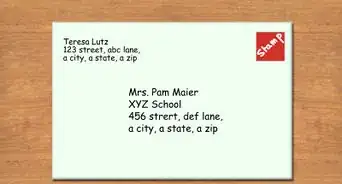This article was co-authored by Jessica Villegas. Jessica Villegas is a Certified Academic Life Coach and the Founder of Hi-Lite Coaching + Consulting in Winter Garden, Florida. Jessica has over 20 years of leadership experience, and she and her team serve teens and young adults through private coaching, group coaching, workshops, and speaking engagements. She uses workbook exercises, coaching planners, and regular check-ins to support young adults in achieving their academic and personal goals. Jessica received her Bachelor’s in Organizational Communications and Leadership Studies from the University of Central Florida and her Professional Coaching certification through Coach Training EDU, an ICF Accredited Institution, as an Academic Life Coach.
This article has been viewed 19,499 times.
If you've made a bad first impression on your teacher, it's still possible for you to fix it and redeem yourself. Start by being honest and acknowledging what caused your bad impression in the first place, and then go from there. In this article, we'll show you how to deal with a teacher who has a negative opinion of you so you can start taking steps toward making a better impression.
Steps
Acknowledging the Bad Impression
-
1Address any specific incidents. There are many reasons a teacher might have a bad impression of you. If you can identify a specific thing you did or said that gave the teacher a bad impression, let them know you understand it. This can be huge way to show maturity.[1]
- Apologize if that is appropriate. For example, you could say, “I’m really sorry I was late on the first day of class. I’m sure that didn’t give a very good impression. However, that was definitely an exception and I plan to always be on time from now on.”
- Don’t overdo it. Generally, a sincere apology followed by meaningful action is enough. Don’t repeat your apology or beg for forgiveness.
-
2Explain any potential misunderstandings. Your teacher may make assumptions about you based on your appearance or behavior. After all, they’ve probably met a lot of students and think they’re able to tell a lot about a student pretty quickly. If you think you’re being misunderstood or judged, help your teacher understand who you really are.
- There might be things about your appearance that cause a teacher to judge you. Take a minute to consider if there’s anything your teacher might be noticing and judging. For example, if you walk into the first day of class with black eye, they might assume you’re the kind of person who gets into fights.
- Simply explain away the misunderstanding by telling the truth. You can say something like, “I know this black eye looks pretty scary. I actually got it playing baseball last week when my team went to the state championships.”
Advertisement -
3Be prepared for class. Teachers notice who’s engaged in class and who comes prepared. If your teacher has a bad impression of you, it could be that they’ve noticed that you don’t show up to class prepared or that you aren’t taking responsibility for your own learning.
- Prepare for class. This doesn’t necessarily mean studying hard or even doing your homework. It means being ready to engage with your teacher and classmates. This includes getting enough sleep and coming to class eager to learn.
- Always have handy any necessary materials such as books, notebooks, or pencils. This shows that you’re taking responsibility for your role as a student.
-
4Work against unjustified bad impressions. Your teacher might have a bad impression of you without you knowing why. This can be very difficult. Sometimes, teachers are just judgemental. Sometimes you remind them of another student they had in the past. Do what you can to show them that you're worthy of more consideration.
- Be kind and patient with your teacher. That's probably how you like to be treated, too.
- If you think the treatment you're getting is really unfair, try asking them why they seem to think badly of you. Letting them know that you notice and are concerned can go a long way.
Making a Good Impression in Class
-
1Complete your work. This might sound obvious, but it can be easier said than done. Even a teacher who has decided that they don’t like you will have a hard time keeping that opinion if they see you consistently finishing your work on time.[2]
- Make sure you complete assignments not just on time, but also thoroughly. For example, if an assignment asks for you to answer in complete sentences, do so. If a math worksheet asks you to show your work, make sure you do.
- Ask for whatever help you need. If you have a hard time completing assignments, get help from a parent, friend, or tutor.
- If your relationship with your teacher isn’t too terrible, you can ask them for help, too. Say something like, “I know I haven’t been great at finishing my work for this class. I want to improve, but I’m struggling with the subject matter. Would you be willing to offer me a little extra help or answer some questions for me after class?”
-
2Participate in discussions. Good teachers will engage students in discussions about the subject matter. Make sure you participate in a polite and engaged way. This usually means raising your hand to speak and listening when others are talking.[3]
- Participating means staying present in class. Never take out your phone or send texts while in class.
- Keep your head up and eyes alert during class discussions.
-
3Keep a low profile. Sometimes, a teacher may have gotten a bad impression of you because you act up in class, talk out of turn, or are generally disruptive. If that’s the case, try to keep a lower profile in class. This will show the teacher that you’re not always seeking attention.[4]
- Make sure to always raise your hand to speak. If you speak a lot in class, maybe try keeping your hand down for a bit to let others talk.
- If your teacher has a poor impression of you because you don’t participate much, try the opposite of keeping a low profile. Speak up more and let them know you’re engaged.
-
4Be on time. Being on time for class lets teachers know that you value their time and energy. After all, it takes a lot of work for them to come to class, too. If you arrive to class with some extra time, ask if there’s anything you can do to help your teacher setup or prepare for class. They’ll probably be grateful that you offered.[5]
- If you’re late consistently, write them a note to apologize and explain yourself.
- Being on time is a good habit to develop early, as it will benefit you throughout your entire life.
Seeking Support from Others
-
1Tell your parents. If you feel that your teacher’s bad impression of you is unfair and unlikely to change, you need to tell an adult whom you trust. They may or may not be able to intervene, but it’s important to seek support and have someone on your team.
- Tell your parents the details of what has gone on, so that they have concrete facts and incidents to consider.
- Your parents may choose to have a meeting or phone conversation with your teacher. While this may seem scary or embarrassing, it can help your teacher to understand that you do want the relationship to change and that it’s important to you.
-
2Surround yourself with good friends. If you have a strong social network, your teacher will see that. It will also help you to feel more comfortable with yourself, which will likely result in you feeling more comfortable in class. This can help you give a better impression because you’ll be able to act authentically, which is something most teachers appreciate.[6]
- If the friends they see you with are good students whom the teacher respects, that is likely to help influence your teacher’s impression of you.
-
3Visit the guidance counselor. If you don’t feel comfortable talking to your parents, make an appointment with your school’s guidance counselor. The counselor is a person who’s neutral and is there to be on your side. Your meeting with them should be confidential and cannot be held against you in class.[7]
- The counselor should be able to offer some advice or guidance and may even be willing to facilitate a conversation between you and your teacher.
Community Q&A
-
QuestionMy homeroom teacher thinks I am very good, but my math teacher told my homeroom teacher that I laughed at another student, and now my homeroom teacher won't like me. What can I do?
 Community AnswerApologize to the student you laughed at and to the math teacher for being disrespectful in her classroom. Talk to your homeroom teacher and tell her that you apologized. If you think she's still upset with you after that, talk to a school counselor and ask for help.
Community AnswerApologize to the student you laughed at and to the math teacher for being disrespectful in her classroom. Talk to your homeroom teacher and tell her that you apologized. If you think she's still upset with you after that, talk to a school counselor and ask for help. -
QuestionWhat do I do if I have to work in a group with someone I dislike? How do I make it so the teacher isn't mad at me for not liking it?
 Community AnswerAct like you like them. If you hate the person, just try your best to be nice. Just remember all you want is a good grade. The other person shouldn't bother you but if it becomes a big deal, go ahead and ask the teacher if you can change groups.
Community AnswerAct like you like them. If you hate the person, just try your best to be nice. Just remember all you want is a good grade. The other person shouldn't bother you but if it becomes a big deal, go ahead and ask the teacher if you can change groups. -
QuestionHow do I do this, but in online class? I forgot to turn in my homework in the first couple of days of school, and my teacher realized recently that I hadn’t turned in classwork from a few days ago.
 Hann BCommunity AnswerApologise to your teacher for not turning in work and if you can, provide them with a reasonable explanation of why you didn't. Make sure you don't forget to hand in any more assignments.
Hann BCommunity AnswerApologise to your teacher for not turning in work and if you can, provide them with a reasonable explanation of why you didn't. Make sure you don't forget to hand in any more assignments.
References
- ↑ http://www.inc.com/jessica-stillman/9-ways-to-fix-a-bad-first-impression.html
- ↑ http://www.kidzworld.com/article/24558-how-to-make-your-teachers-like-you
- ↑ http://www.kidzworld.com/article/24558-how-to-make-your-teachers-like-you
- ↑ http://www.school-for-champions.com/grades/when_teacher_is_a_jerk.htm#.V6LbhzWmrfY
- ↑ http://education.seattlepi.com/advantages-being-time-vs-being-late-school-3477.html
- ↑ http://www.calmclinic.com/social-anxiety/student-school-life
- ↑ http://kidshealth.org/en/teens/school-counselors.html#
